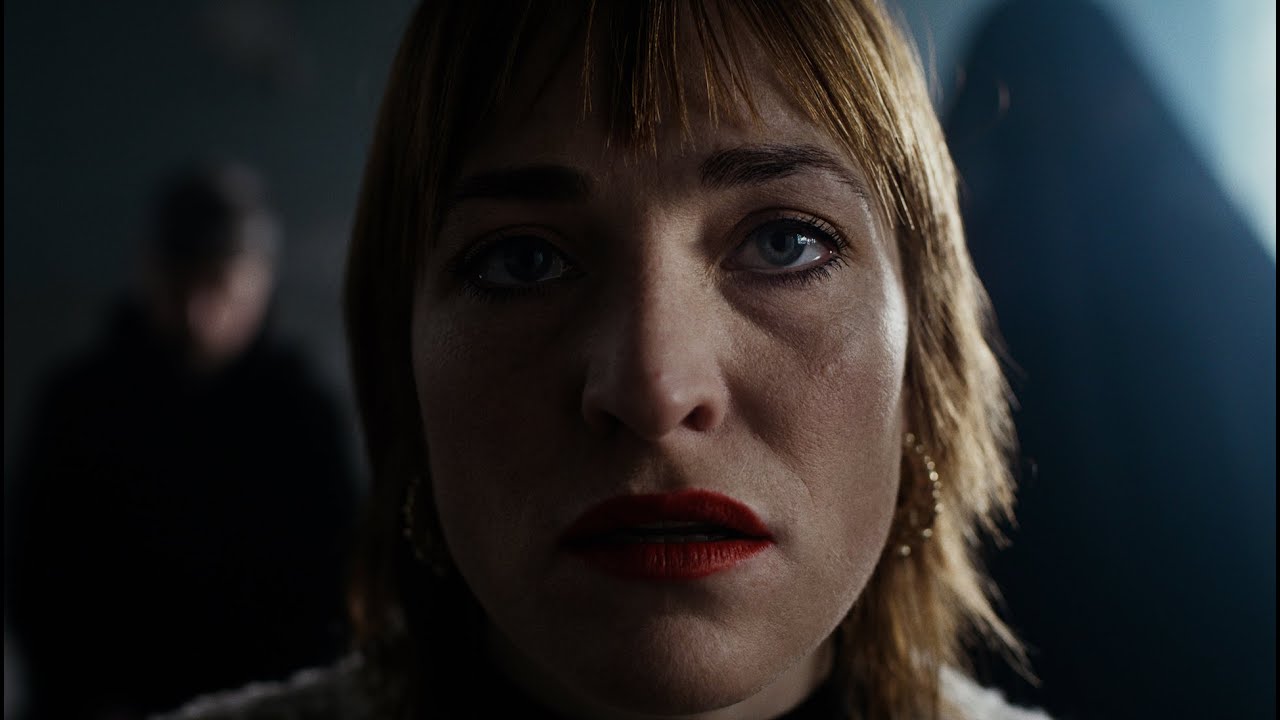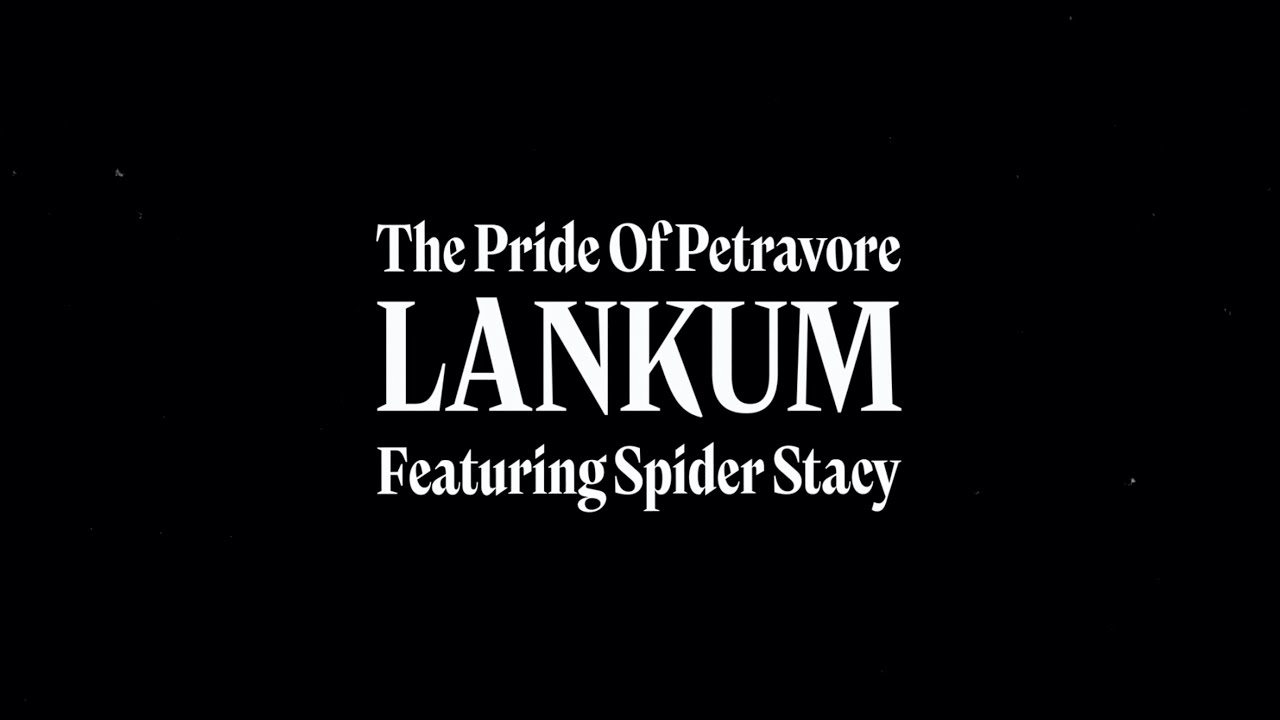Try as he might, Ian Lynch struggles to meditate. “I find it too difficult,” he says over drinks in a North Dublin pub. “I just can’t.” There are only two scenarios, the vocalist, piper, concertina player, whistler and multi-instrumentalist says, in which he can come close to a similar feeling of transcendence: swimming in the sea, “because it’s such a physical thing,” and playing with his bandmates in Lankum. “That’s when I’ve been able to just block everything out, absolutely everything. When you’re being hit by so many frequencies at once, you just zone out.”
During the coronavirus lockdown, the foursome had a revelation when it came to intensifying that aspect of their music. Preparing a performance to be livestreamed titled A National Disgrace, they decided to weave their songs together into one continuous piece, almost as a challenge. “Figuring out how to make a song slowly morph and grow into another, even if there was nothing matching it,” says Ian’s brother Daragh Lynch, Lankum’s guitarist and a multi-instrumentalist. Directly inspired by that experiment’s success, the group’s new album False Lankum is peppered with three short abstract segments, each titled ‘Fugue’, that were recorded together as one long improvisation. The sounds are organic, the creaking, clattering and clanging of metal and wood, the faint roll of drums, but set free of any form of structure and tune, dismembered sounds set floating in a void. The double meaning of the word ‘Fugue’, both a form of musical composition and a psychological state in which a person loses all sense of identity, is intentional.
It might be Lankum’s clearest embrace so far of all-out disorientation, but with every release since their first album Cold Old Fire in 2014 the band have been pushing things further outwards. They are ostensibly a folk band, playing a mixture of their own material, covers and traditional songs, but what sets them apart is the way they elevate the energy of their source material with elements of drone, black metal, and wider experimental music. The arrival of John ‘Spud’ Murphy as producer between their second record Between The Earth And Sky and their third The Livelong Day – they now consider him a de facto fifth member – was crucial. Their sound post-Spud is bigger and bolder, capable of heavenly beauty and hellish cacophony.
On False Lankum, says Radie Peat (whose long list of credits on False Lankum include reeds, concertina, hammond organ, harmonium, harp, mellotron, piano and bayan), “we’ve become a more extreme version of ourselves. The dark bits are literally horror, and the light bits are really, really sweet. The contrast has become heightened.” Take the slow, dreadful march of opener ‘Go Dig My Grave’ for an example of the former; the immensely stirring ballad of forbidden love ‘Newcastle’ for the latter (Peat sings lead on both). She likens the band’s progression to an ever-growing tolerance for drugs. “It’s like, ‘That doesn’t do it for me any more! It needs to be more extreme!’ Although that doesn’t bode well for the future, does it?” “That’s how Scott Walker ended up punching slabs of meat,” Daragh Lynch points out. This is where the Fugues come in handy. As well as their immersive qualities as a separate entity, their presence is so otherworldly and odd, so disconnected from the dramatic swings in tone elsewhere on the record, that they allow the group to move deftly from one extreme to the other without lurching.
It’s a record of enormous variety, but there is one constant. The sea, that other place where Ian Lynch finds a state akin to a meditative trance, flows through the record’s core. ‘The New York Trader’, the record’s most theatrical moment of all, is one of a group of songs traditionally called the Jonah Ballads, all of which centre on a criminal onboard a ship (in this case a malevolent, murderous captain) being detected by supernatural means and thrown overboard by the crew to avert disaster. The conversely plaintive ‘Clear Away In The Morning’ is a song by the 20th century American musician and sailor Gordon Bok, about his inner tug of war between longing both for the ocean and for home.
This makes sense, given that the album was mostly written in a Martello Tower on an island just off the eastern coast (a few kilometres from the tower in which James Joyce set the opening of Ulysses). Due to lockdown restrictions, the band used it as their base where they could live as a bubble and continue working in intensive two-week bursts. Every day they’d cross a bridge from the present to the past, from their living quarters – a modern extension – over to the old tower, built in 1804. “We saw the sea every morning, in all weathers it was gorgeous,” Peat recalls. The curious thing, however, is that Lankum did not intend to give the record this overarching theme. The sea emerged as a binding agent entirely subconsciously, even on the two songs the group wrote themselves. The hypnotic ‘Netta Perseus’ centres on a woman with “eyes like an ocean”, and the record’s final track ‘Turn’ closes the album on an image of a ship sailing over the horizon.

Photo by Sorcha Frances Ryder
“The last album was the same, you only make sense of it afterwards,” says Ian Lynch. Their debut Cold Old Fire revealed itself as “very Dublin-centric,” after they made it, he says. “Then Between The Earth And Sky was taking in all of Ireland, and The Livelong Day was universal. I like thematic albums, but there’s something to be said for just going in and trusting the process.”
That process, he explains, is simply to play until the songs that will work for the record reveal themselves. “Some of them stick, and some of them don’t.” This is not always in the most obvious manner, however. Cormac Mac Diarmada (percussion, guitar, hammer dulcimer, banjo, fiddlestrings and more) takes ‘The Pride Of Petravore’, from their last album The Livelong Day, as an example. “We were just dicking about with something called Dead Man’s Tuning.” They kept reducing and reducing, until Mac Diarmada was playing only a weird lurching noise on the viola. Ian Lynch, meanwhile, taped two whistles together and began playing a popular tune written by the comic songwriter Percy French. Usually, ‘The Pride Of Petravore’ (also known as ‘Eileen Oge’), set to a traditional hornpipe melody, is performed with a jaunty, upbeat swing in its rhythm and a romantic croon carrying the vocal narrative about a man’s regret about seeing his town’s most beautiful woman marry another man, but Lankum wanted to turn it into what Ian Lynch describes as “something like an Orcish war march. If there’s orcs playing whistles, they’re gonna be shit, so we made it loose, rough and brutal.”
The experiment was, at first, a joke. “I remember our manager hearing what was basically just whistles and Cormac going ‘mmmmWHACK’ and he was like, ‘this is a bonus track, yeah?’” recalls Daragh Lynch with a laugh. “But the more we started to stick on it, the more we realised that there was actually something to it.” The version that appears on The Livelong Day is completely extraordinary. Producer Spud helps tease out an enveloping black void of sonic atmospherics, all eerie creaks and dissonant scratches, before Mac Diarmada’s lolloping rhythm begins to form, growing ever more urgent and claustrophobic. Ian Lynch’s whistles twist that familiar romantic tune into a manic squall. This lumbering beast of a song is suddenly anything but a silly experiment. A 2020 live recording featuring The Pogues’ Spider Stacy is even more intense, and concludes with a refrain from Sting’s 1985 anti-nuclear song ‘We Work The Black Seam’, albeit taken from the far punchier cover version of Bradford vocal group Swan Arcade. “One of those cases where the actual songwriter, Sting, did a shit version of his own song,” laughs Peat. Again, Lankum were only messing about when they realised the chord progressions were similar.
‘The Pride Of Petravore’ demonstrates in microcosm the way Lankum are able to deftly navigate across several different musical strands. Their approach to music is playful, irreverent and experimental, unafraid to suck in influences from leftfield, but the sound they produce has an enormity and depth that can only come from a simultaneous respect for the long histories that many of their songs are rooted in. There are aspects of trad – which the band differentiate from the broader and more amorphous term ‘folk’ – that can be restrictive, but as Ian Lynch, who is also a researcher and lecturer in folklore, points out, that strictness need not be a bad thing. “In order for traditional tunes to be passed on, you do need in some way to have that kind of mindset,” he points out. When he was learning the pipes, he recalls, “they used to say, ‘Always be careful about the music you’re listening to. Don’t be listening to some modern player who’s gonna give you the wrong ideas.’ I hope if someone’s serious about learning traditional music, they’re not listening to us!” Rather than presenting themselves as exemplars of that serious side, says Peat, “I like to think of us as a gateway.” Ian Lynch agrees. “I think it’s important to have bands who are in some way accessible, then once you’ve got used to those kinds of sounds you’re open to hearing stuff that’s straight-up tradition. It’s like that with any genre, whether you’re talking black metal, noise, or classical music, there’s the outer layer that you have to train your ears to.”
Lankum’s ability to appeal to a wider audience has had tangible benefits for the band too. Winners of the RTÉ Choice Music Prize in 2019 (and nominees in 2017), as well as a slew of prizes from both the RTÉ Radio 1 and BBC Radio 2 folk awards, they have had a level of success that now borders on mainstream. They have sold out most dates of their forthcoming Spring tour of the UK and Ireland, including a prestigious Barbican slot, and in December will play their biggest show yet at London’s Roundhouse. After our interview, I witness two young men, one of whom is wearing a Lankum pin badge, starstruck to the point of temporary paralysis after spotting the Lynch brothers. Yet it was not always apparent that the group would strike such a chord. “In hindsight it might appear clear that traditional songs were gonna have a bit of a resurgence, but it wasn’t clear at the time [we started]. We’d think, ‘Who the fuck’s gonna sit and listen to a ten-minute Child Ballad apart from us?’” says Peat. “We knew we were weird, that what we were aiming for was weird, but it’s been cool to discover that so many people are willing to come onto the same page as us.”
It’s pleasing, given the way that a sense of community has always been central to Lankum’s view of folk music. As a teenager, “going to sessions and seeing the communal nature of it, people making music amongst themselves, was what first got me fascinated,” Ian Lynch says. Peat, meanwhile, who was raised playing trad and folk music from the age of five, grew up in such spaces. When she was around 14, she first played at The Cobblestone, a Dublin pub which hosts sessions seven nights a week, as well as gigs, classes and tutoring. Lankum would later go on to play their first ever shows there, take their first band photoshoot there, and take part at countless sessions.

Photo by Steve Gullick
I pay the pub a visit the night before I meet the band, a particularly dark and wet Wednesday. Every other pub in the neighbourhood, Smithfield, is almost empty, but in The Cobblestone it’s hard not to be momentarily overwhelmed by the energy. In one corner multiple signs read, in both English and Irish, ‘Musicians Only’. The five players who sit beneath them are not ‘on stage’. They play with their heads down in concentration, and at the end of a tune chat and drink for a while before starting up again once conversation begins to dry up. “The whole thing is a social interaction,” Peat points out. Adds Mac Diarmada: “What’s interesting about The Cobblestone is that they’ve 100 per cent embraced that sense of rhythm. They allow you to naturally be.”
Such environments are growing scarcer. Dublin is facing a crisis when it comes to its cultural and social spaces. In a week in late 2021 that saw protests over the forced eviction of squatters in Stoneybatter, reports that Trinity College’s Science Gallery was to close due to lack of financial viability, and that the city’s largest independent bookshop Chapters was to close (it was revived by new owners the following year), the Irish Times was moved to ask whether the city was “losing its cultural soul.” The Cobblestone itself was set to be turned into a hotel until an unprecedented number of objections forced the City Council to refuse planning permission. But even in healthier times, The Cobblestone was unique. “I don’t think in other pubs there’s the same respect for the music. It makes such a big difference when the people running the bar are encouraging,” days Peat. “There’s lots of places in [the trendier neighbourhood] Temple Bar that probably have music seven nights a week too, but it’s to be consumed, it has to be appealing to tourists. At The Cobblestone no one’s asking you to play ‘Galway Girl’. You have to have places like that, because you can’t learn something like traditional music fast. You have to be going for years to ingest all the songs.”
It’s easy to trace the spirit of The Cobblestone, at once open-minded and deadly serious, to Lankum’s work, but the band are also keen to point out that it’s not the only strand that feeds into their music. Much has been made of Ian Lynch’s teenage interest in DIY punk and anarcho music, and the way it was the parallels he spotted between that and the more political end of folk music like Christy Moore that first drew him to the form, but “that’s only one small element of the whole picture,” he says pointedly. Daragh Lynch concurs. “There’s so much other mad music we’re into. Cormac for example would have grown up listening to the stuff his brothers [who are in the experimental collective The Jimmy Cake] were playing.” “The last album they did was just two tracks, 40 minutes of pure doom,” Mac Diarmada says. “And seeing how trajectories like that can happen is an enabling thing.” In general, says Peat, “I’m always dubious about any kind of grouping in terms of music. I’ve always been extremely bad at understanding what they mean. I don’t like to categorise too much, and influence-wise we’ve listened to an absolutely huge amount of stuff.

Photo by Sorcha Frances Ryder
“When you make music, [categorisation] isn’t the kind of thing you think of. Your only guiding principle is, ‘Does this sound good, and does it feel honest?’ Then it goes into the engine of your brain that’s coloured by all the other things you’re interested in.” Tradition and history is important, adds Ian Lynch, but it is also important to remember that folk music has always, by its very nature, allowed for progress, experimentation, and cross-cultural pollination: “I don’t think there’s any such thing as purity when it comes to traditional song, or any music for that matter. Even the instruments you see in the Irish tradition now, they haven’t always been there. Go back 50 years and some people thought the mandolin and the bouzouki were anathema to the Irish tradition. Go back 150 years and the Gaelic League were giving out about concertinas, saying Irish music is just the pipes and the fiddle. Go back 200 years and there’s no fiddle. It’s a story of constant movement and influences coming in from other countries.”
Perhaps that is the reason that False Lankum looks so much towards the sea, the place where Ian Lynch finds an element of transcendence from the self, and where songs can transcend arbitrary borders of nationality. “You’ll find parallels of the same songs all over the English speaking world, sometimes even further. Some older traditional songs exist in folk tale form in India, ancient Persia or some 6th century Hindu text. Borders don’t make any sense in terms of how singing is concerned.”
Whether their embrace of influences from across the musical spectrum, the way they combine both traditional and progressive instincts, or even the way their albums cross from covers to self-penned songs with such ease, Lankum, too, are at their best when they operate across the thresholds.




